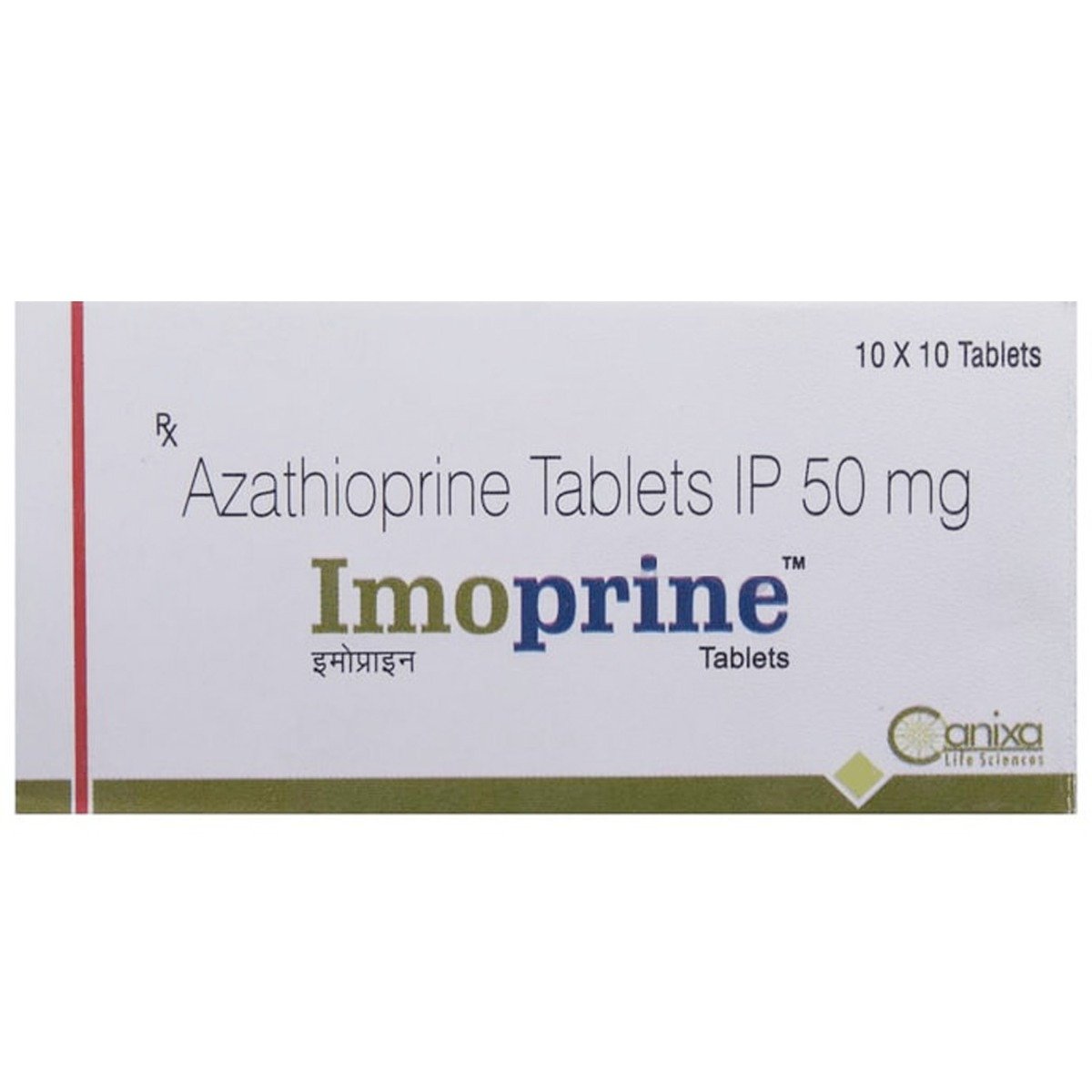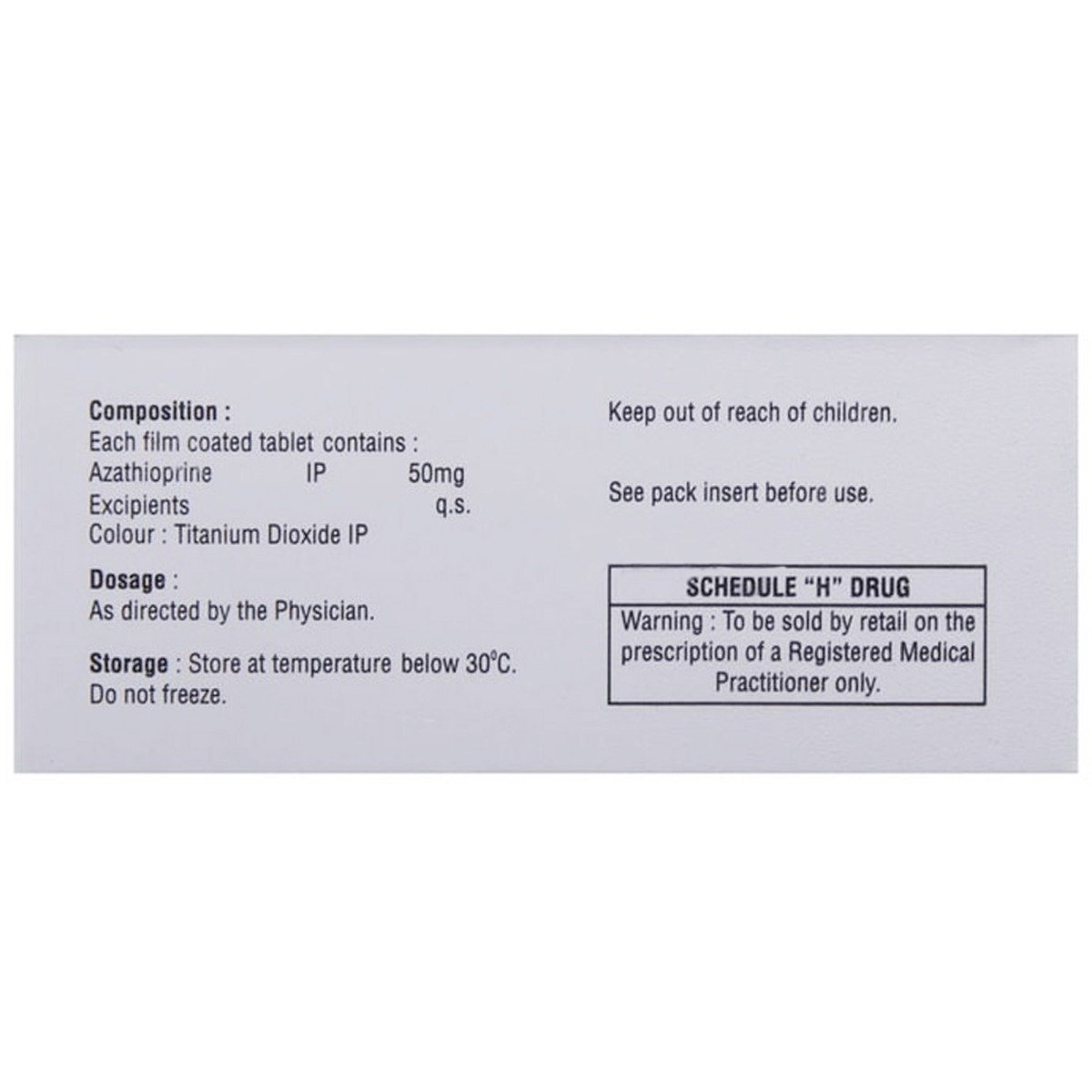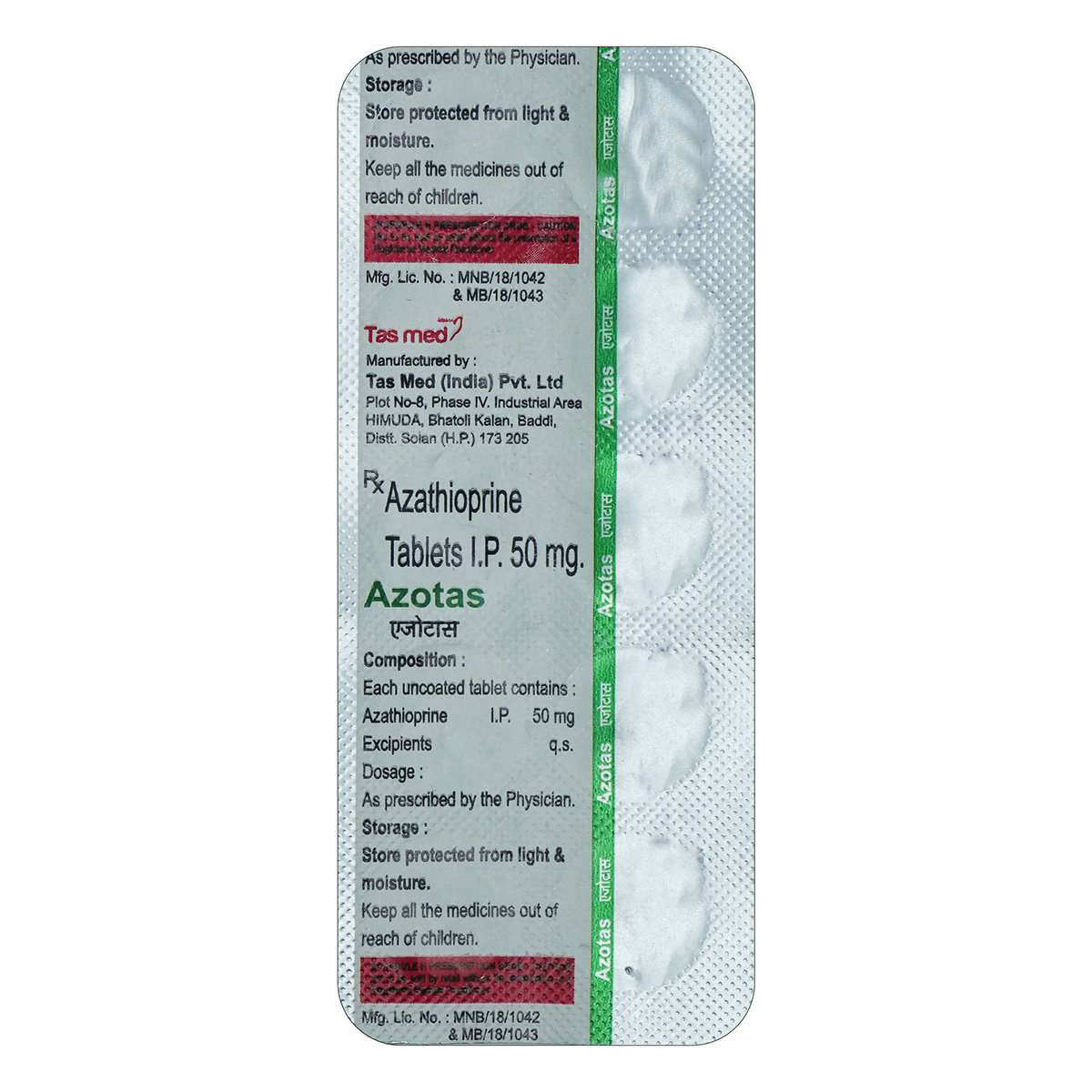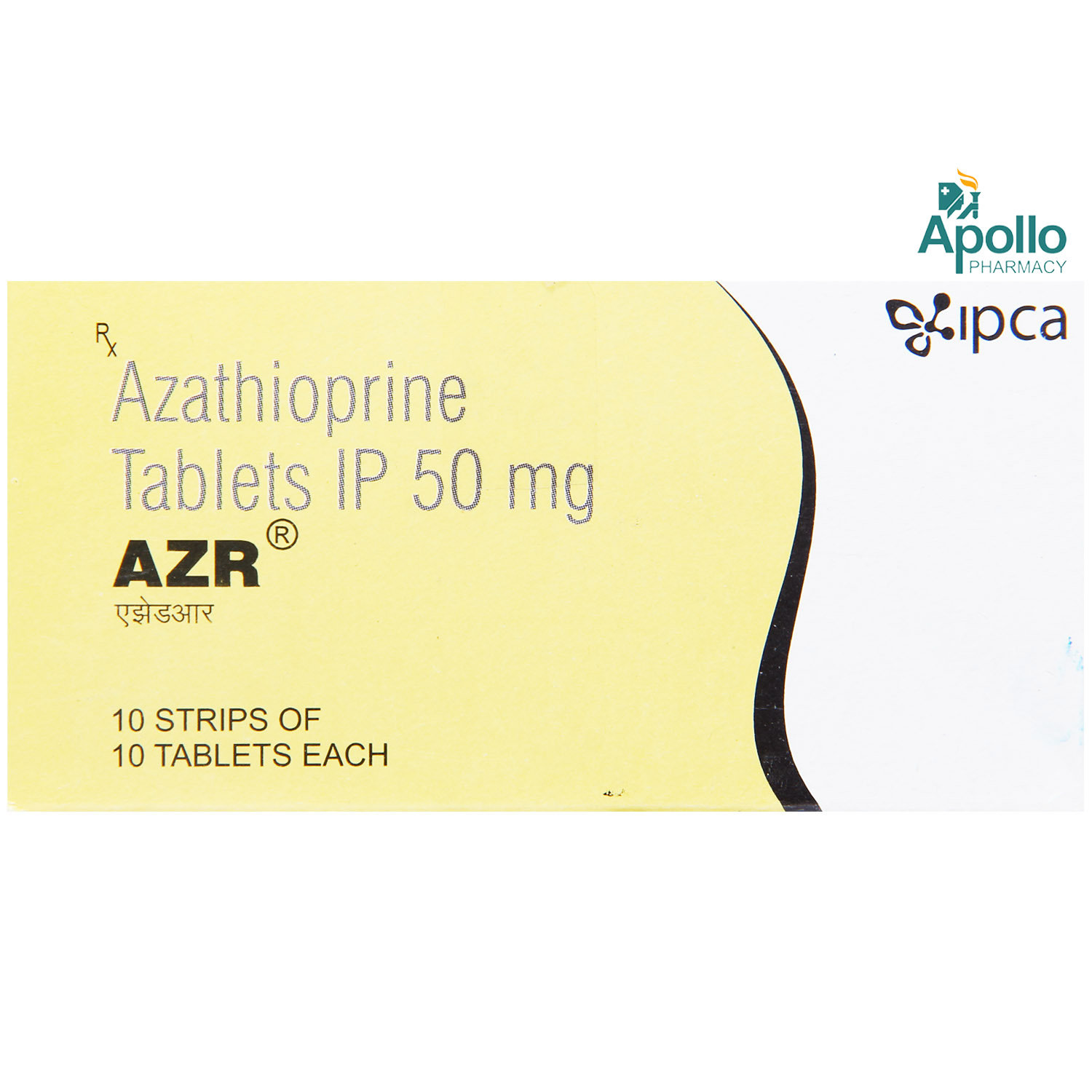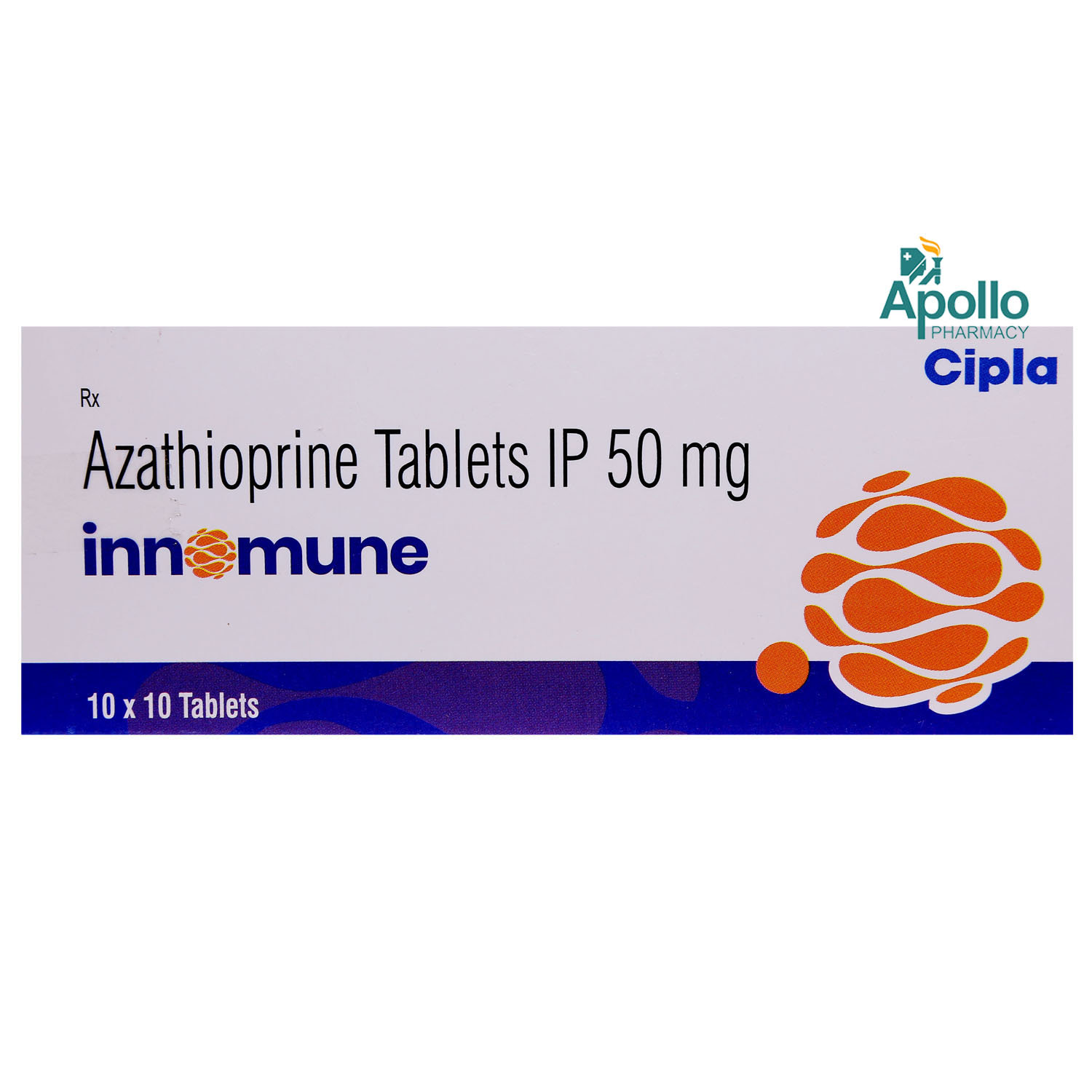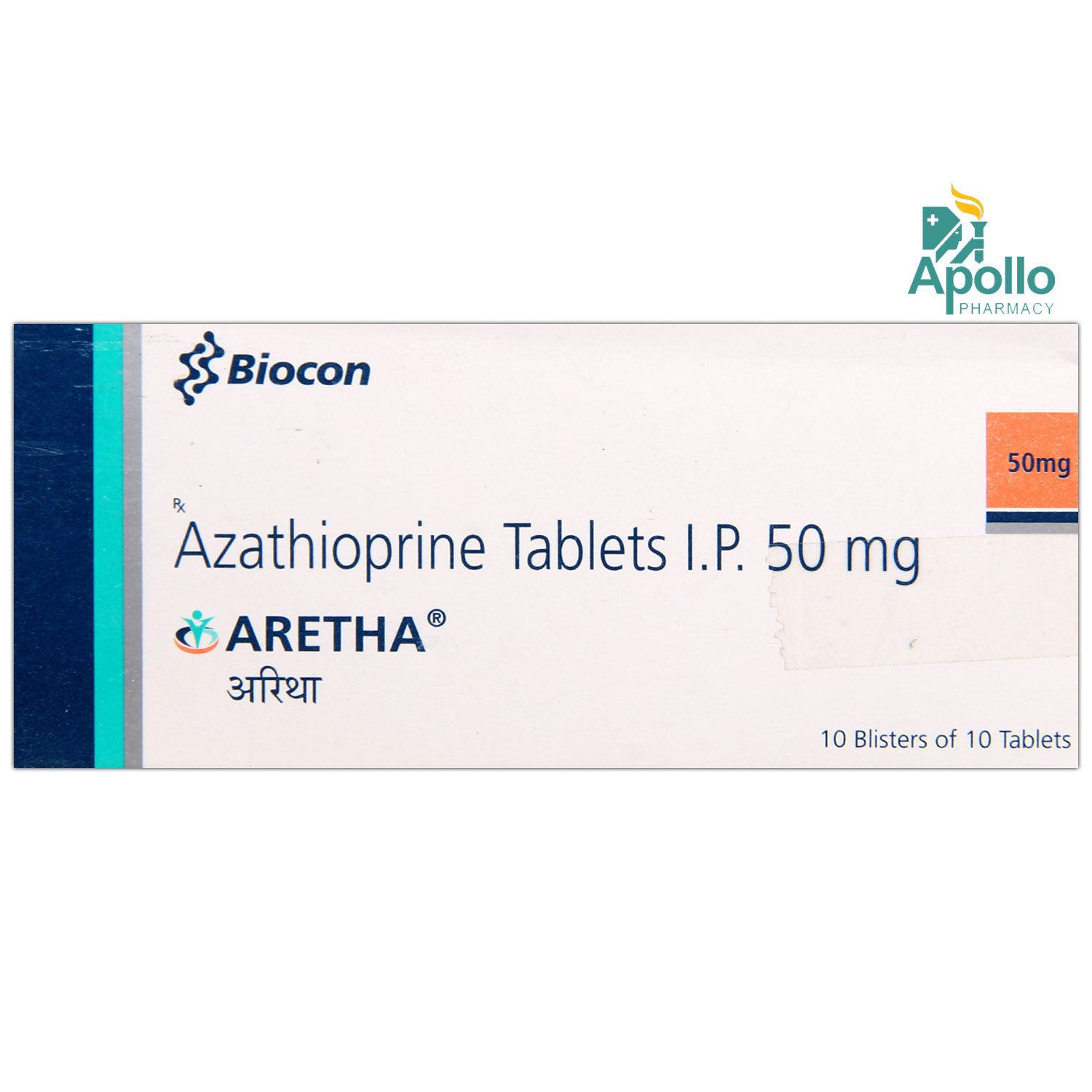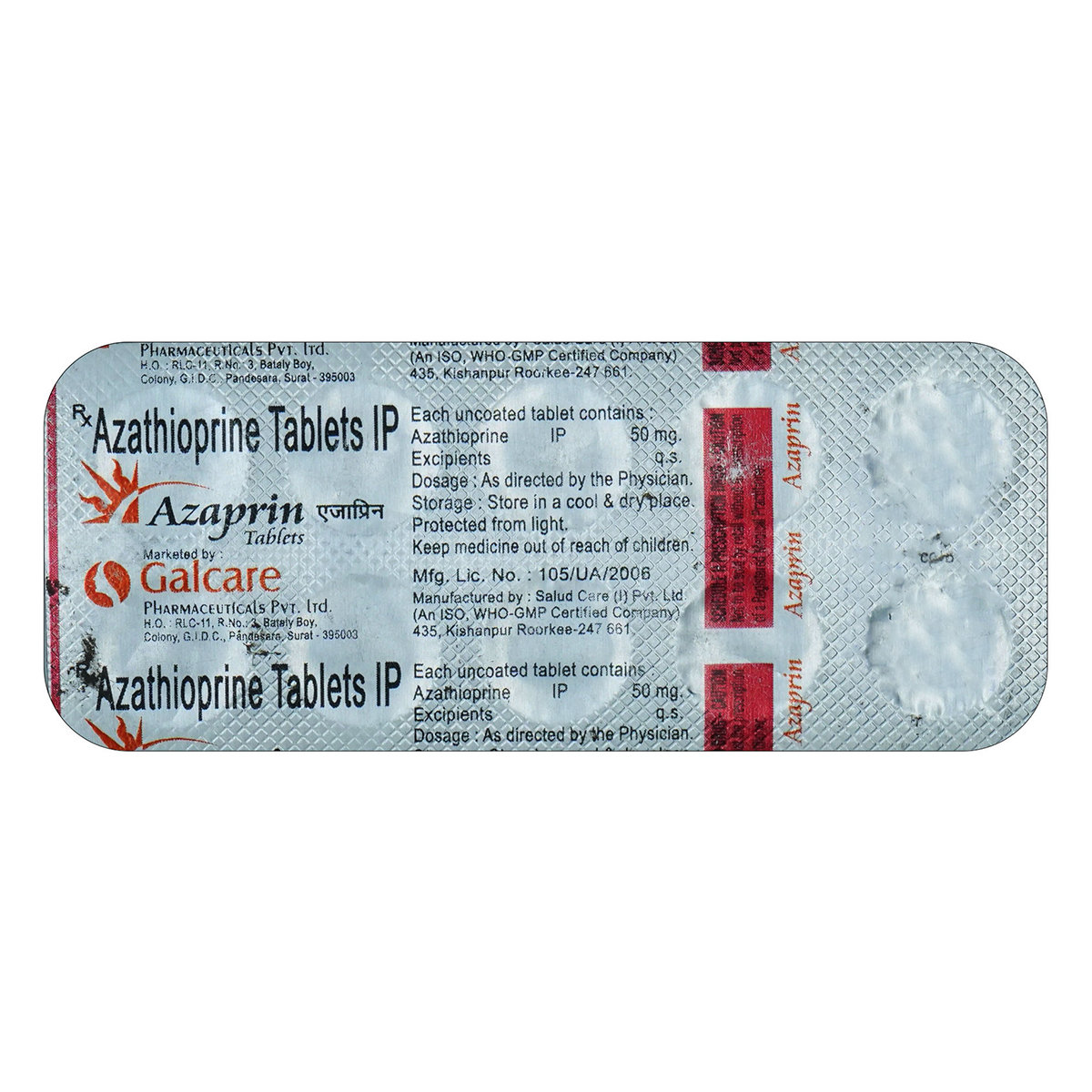Imoprine Tablet 10's
MRP ₹114
(Inclusive of all Taxes)
₹17.1 Cashback (15%)
Provide Delivery Location
Online payment accepted
 Prescription drug
Prescription drugWhats That
Composition :
Manufacturer/Marketer :
Consume Type :
Expires on or after :
Return Policy :
NPPA :
About Imoprine Tablet
Imoprine Tablet belongs to the class of medicine called 'immunosuppressant' that helps to reduce the pain/inflammation in rheumatoid arthritis conditions and keep the immune system from attacking new transplant organs like kidneys. Besides this, it also treats pain and inflammation in gastrointestinal issues like Crohn's disease, and ulcerative colitis, for patients who have undergone a kidney transplant.
Imoprine Tablet contains 'Azathioprine' that works by reducing the function of the cells, causing inflammation, especially in the joint tissues thereby decreasing pain, inflammation, and slowing down the joint damage and disease progression over time. Besides this, after an organ transplant, your body will try to attack the new organ as it sees it as foreign. Imoprine Tablet helps stop your body from rejecting a new organ by suppressing your immune system.
Take Imoprine Tablet as prescribed. Your doctor will advise you on how often you take Imoprine Tablet based on your medical condition. In some cases, you may experience certain common side-effects such as nausea, headaches, vomiting, diarrhoea, unusual fatigue, dizziness, headache, loss of appetite, increase in liver enzymes, lowered resistance to infections, tingling sensation, stomach pain, leukopenia (decreased number of white blood cells), and sore throat. Most of these side effects do not require medical attention and will resolve gradually over time. However, you are advised to talk to your doctor if you experience these side effects persistently.
To treat your condition effectually, continue taking Imoprine Tablet for as long as your doctor has prescribed. To avoid recurring symptoms, do not stop it midway. Do not take Imoprine Tablet if you are pregnant or planning for pregnancy. Imoprine Tablet should not be taken by breastfeeding mothers as it passes into breast milk. Imoprine Tablet should not be given to children as safety and efficacy have not been established. Imoprine Tablet may make you more susceptible to infections; consult your doctor if you develop any signs of severe conditions such as fever, sore throat, breathlessness, jaundice, unexplained bleeding, or bruising. Avoid excessive exposure to sunlight, wear protective clothing, and use protective sunscreen with a high protection factor while using Imoprine Tablet . While taking Imoprine Tablet , do not contact anyone who has shingles, chickenpox, or measles. If you accidentally come in contact with any person having them, please inform your doctor immediately as it requires special treatment if you have not had these illnesses. Your doctor may advise you to undergo regular blood tests, kidney and liver tests to monitor your condition. Inform your doctor about your health condition and medicines to rule out any unpleasant side effects.
Uses of Imoprine Tablet
Directions for Use
Key Benefits
Imoprine Tablet contains 'Azathioprine' which is an immunosuppressant that works by reducing the function of the cells, causing inflammation in the joint tissues. It reduces pain, inflammation, and slow joint damage and disease progression over time. Besides this, after an organ transplant, your body will try to attack the new organ as it sees it as foreign. Imoprine Tablet helps stop your body from rejecting a new organ by suppressing your immune system. Imoprine Tablet is also used to treat severe inflammatory diseases of the skin, Crohn's disease and ulcerative colitis, and some blood disorders.
Storage
- Aim for at least five servings of a well-balanced diet per day that is full of vibrant fruits and vegetables.
- Eat more whole foods, lean meats, and plant-based foods, and eat healthy fruits like bananas, oranges, and berries.
- Limit alcohol intake and abstain from smoking to promote general wellbeing.
- Boost your immunity by including immune rich foods in your diet and always remember to stay hydrated.
- Get sufficient sleep and manage stress which helps in improving white blood cell count.
- Consult your doctor for an effective treatment to improve the blood cell count and get regular body check up to monitor changes in the count.
- Try to prevent the factors that cause a decrease in the white blood cells that may lead to impaired immunity.
- Inform your doctor about the nausea and discuss possible alternatives to the medication or adjustments to the dosage.
- Divide your daily food intake into smaller, more frequent meals to reduce nausea.
- Opt for bland, easily digestible foods like crackers, toast, plain rice, bananas, and applesauce.
- Avoid certain foods that can trigger nausea, such as fatty, greasy, spicy, and smelly foods.
- Drink plenty of fluids, such as water, clear broth, or electrolyte-rich beverages like coconut water or sports drinks.
- Use ginger (tea, ale, or candies) to help relieve nausea.
- Get adequate rest and also avoid strenuous activities that can worsen nausea.
- Talk to your doctor about taking anti-nausea medication if your nausea is severe.
- Record when your nausea occurs, what triggers it, and what provides relief to help you identify patterns and manage your symptoms more effectively.
- Preventing Vomiting (Before it Happens)
- Take medication exactly as prescribed by your doctor. This can help minimize side effects, including vomiting.
- Having a small meal before taking your medication can help reduce nausea and vomiting.
- Talk to your doctor about taking anti-nausea medication along with your prescribed medication.
- Managing Vomiting (If it Happens)
- Try taking ginger in the form of tea, ale, or candy to help alleviate nausea and vomiting.
- What to Do if Vomiting Persists
- Consult your doctor if vomiting continues or worsens, consult the doctor for guidance on adjusting your medication or additional treatment.
- Include iron-rich foods like dark leafy vegetables, lean red meat, legumes and fish in your diet.
- Consume vitamin C-rich foods as they aid iron absorption.
- Limit tea, cocoa, and coffee as these can slow iron absorption.
- Exercise regularly; however, do not overdo it.
- Managing a low platelet count (thrombocytopenia) caused by medication usage requires a multi-step approach. Here are some steps to help manage the condition:
- Inform your doctor about your low platelet count and medication usage. They will assess the situation and guide the best course of action.
- Your doctor may recommend adjusting or stopping the medication that is causing a low platelet count. This could involve switching to alternative medication or reducing the dosage.
- Monitor your platelet count regularly through blood tests to track any changes. This will help the doctor determine the effectiveness of the treatment plan.
- If an underlying condition, such as infection or inflammation, contributes to the low platelet count, your doctor will treat it.
- In some cases, alternative treatments like platelet transfusions or medications that stimulate platelet production may be necessary.
- Avoid risky activities and certain medications; eat a balanced diet with plenty of water to reduce bleeding risk and boost overall health.
- If you experience severe bleeding or bruising, seek emergency medical attention immediately.
Drug Warnings
Do not take Imoprine Tablet if you are allergic to any immunosuppressant medicines or Azathioprine. Let your doctor know before using Imoprine Tablet if you have liver or kidney problems, serious blood disorders, immune system problems, bone marrow problems, serious infections, immunodeficiency syndrome, or if you have a condition where your body produces too little of a natural chemical called thiopurine methyltransferase (TPMT), received any vaccinations. Do not take Imoprine Tablet if you are pregnant or planning for pregnancy as Imoprine Tablet is a Pregnancy category risk D medicines which can cause serious congenital disabilities to the unborn baby. Imoprine Tablet should not be taken by breastfeeding mothers as it passes into breast milk. While taking Imoprine Tablet , do not contact anyone who has shingles, chickenpox, or measles. If you accidentally come in contact with any person having them, please inform your doctor immediately as it requires special treatment if you have not had these illnesses. Imoprine Tablet causes dizziness and drowsiness, so drive with caution. Imoprine Tablet should not be given to children as safety and efficacy have not been established. Avoid consuming alcohol along with Imoprine Tablet as it could lead to increased dizziness. Your doctor may advise you to undergo regular blood tests, kidney and liver tests to monitor your condition. Using Imoprine Tablet for a long time can increase your chance of getting certain types of cancer, such as lymphoma (cancer of the spleen, thymus gland, and bone marrow), leukemia (blood cancer), and skin cancer. Avoid excessive exposure to sunlight, wear protective clothing, and use protective sunscreen with a high protection factor while using Imoprine Tablet .
Drug-Drug Interactions
Drug-Drug Interactions
Login/Sign Up
Taking Imoprine Tablet and Febuxostat together can increase the blood levels of Imoprine Tablet
How to manage the interaction:
Taking Imoprine Tablet with Febuxostat is not recommended, but it can be taken together if prescribed by a doctor. However, if you experience any unusual symptoms contact a doctor immediately. Do not stop using any medications without talking to a doctor.
When Imoprine Tablet and Adalimumab are taken together, they may raise the risk of severe infections.
How to manage the interaction:
Although there is a possible interaction between Imoprine Tablet and Adalimumab, you can take these medicines together if prescribed by a doctor. However, if you have any of these symptoms- fever, chills, diarrhea, sore throat, muscle aches, difficulty breathing, blood in phlegm (a thick secretion in the airway during disease and inflammation), losing weight, or pain while peeing, make sure to contact a doctor immediately. Do not stop using any medications without a doctor's advice.
When Imoprine Tablet and Golimumab are taken together, they may raise the risk of severe infections
How to manage the interaction:
There may be a possibility of interaction between Imoprine Tablet and Golimumab, but it can be taken if prescribed by a doctor. However, if you have any of these symptoms- fever, chills, diarrhea, sore throat, muscle aches, difficulty breathing, blood in phlegm (a thick secretion in the airway during disease and inflammation), losing weight, or pain while peeing, make sure to contact a doctor immediately. Do not stop using any medications without a doctor's advice.
When Imoprine Tablet and Certolizumab are taken together, they may raise the risk of severe infections
How to manage the interaction:
Although there is a possible interaction between Imoprine Tablet and certolizumab, you can take these medicines together if prescribed by a doctor. However, if you have any of these symptoms- fever, chills, diarrhea, sore throat, muscle aches, difficulty breathing, blood in phlegm (a thick secretion in the airway during disease and inflammation), losing weight, or pain while peeing, make sure to contact a doctor immediately. Do not stop using any medications without a doctor's advice.
Coadministration of Imoprine Tablet and Infliximab can increase the risk or severity of developing infections.
How to manage the interaction:
Although taking Infliximab and Imoprine Tablet together can cause an interaction, it can be taken if a doctor has suggested it. If you have any symptoms like fever, chills, diarrhea, sore throat, muscle aches, difficulty breathing, weight loss, and pain or burning when you urinate, it's important to contact a doctor right away. Do not discontinue any medications without consulting a doctor.
Taking Imoprine Tablet with Natalizumab can raise the risk of severe infections.
How to manage the interaction:
Although taking Imoprine Tablet and Natalizumab together can cause an interaction, it can be taken if a doctor has suggested it. However, if you have any of these symptoms- fever, chills, diarrhea, sore throat, muscle aches, difficulty breathing, blood in phlegm(a thick secretion in the airway during disease and inflammation), losing weight, or pain while peeing, progressive weakness on one side of the body, clumsiness of limbs, disturbance of vision, confusion, or changes in thinking, memory and personality, make sure to contact a doctor immediately. Do not stop using any medications without a doctor's advice.
When Imoprine Tablet and Clozapine are taken together can increase the risk of developing serious infections.
How to manage the interaction:
Co-administration of Imoprine Tablet with Clozapine can result in an interaction, but it can be taken if a doctor has advised it. However, consult a doctor immediately if you have a fever, chills, diarrhea, sore throat, muscle aches, shortness of breath, blood in phlegm, weight loss, red or irritated skin, body sores, and pain or burning during urination. Do not stop using any medications without a doctor's advice.
Taking Imoprine Tablet with Leflunomide can increase the risk of side effects which may lead to anemia, bleeding problems, or infections.
How to manage the interaction:
Taking Leflunomide with Imoprine Tablet together can result in an interaction, they can be taken together if prescribed by a doctor. However, consult a doctor if you experience fatigue, dizziness, lightheadedness, unusual bleeding or bruising, fever, chills, diarrhea, sore throat, muscle aches, shortness of breath, weight loss, red or inflamed skin, body sores, pain or burning during urination. Do not discontinue any medications without consulting a doctor.
Taking the BCG vaccine with Imoprine Tablet can increase the risk of infection.
How to manage the interaction:
Co-administration of Imoprine Tablet with BCG vaccine can result in an interaction, but it can be taken if a doctor has advised it. If you notice any signs of infection, it's important to contact a doctor right away. Do not discontinue any medications without consulting a doctor.
Taking Imoprine Tablet with Deferiprone can increase the risk of developing serious infections.
How to manage the interaction:
Although there is a possible interaction between Imoprine Tablet and Deferiprone, you can take these medicines together if prescribed by a doctor. However, consult a doctor immediately if you have a fever, chills, diarrhea, sore throat, muscle aches, shortness of breath, blood in phlegm, weight loss, red or irritated skin, body sores, and pain or burning during urination. Do not stop using any medications without a doctor's advice.
Drug-Food Interactions
Drug-Food Interactions
Login/Sign Up
Diet & Lifestyle Advise
- Physical activity helps in strengthening muscles and relieves joint stiffness. Gentle activities like 20-30minutes of walking or swimming would be helpful.
- Performing yoga may also help in improving joint flexibility and pain management.
- Maintain a healthy weight by performing regular low-strain exercises and eating healthy food.
- Get adequate sleep as resting the muscles can help in reducing inflammation and swelling.
- Follow heat or cold therapy, apply a cold or hot compress on the joints for 15-20minutes regularly.
- De-stress yourself by meditating, reading books, taking a warm bubble bath, or listen to soothing music.
- Acupuncture, massage, and physical therapy may also be helpful.
- Eat food rich in antioxidants such as berries, spinach, kidney beans, dark chocolate, etc.
- Foods containing flavonoids help in reducing inflammation. These include soy, berries, broccoli, grapes, and green tea.
- Avoid smoking and alcohol consumption.
Side Effects of Imoprine Tablet
- Nausea
- Headaches
- Vomiting
- Diarrhoea
- Unusual fatigue
- Dizziness
- Headache
- Loss of appetite
- Increase in liver enzymes
- Lowered resistance to infections
- Tingling sensation
- Stomach pain
- Leukopenia (decreased number of white blood cells)
- Sore throat
Habit Forming
Therapeutic Class
All Substitutes & Brand Comparisons
RX
Immugen 50 Tablet 10's
Newgen Life Sciences Pvt Ltd
₹11
(₹0.99 per unit)
90% CHEAPERRX
Out of StockAzolet 50mg Tablet
Ikon Remedies Pvt Ltd
₹99.96
(₹9.0 per unit)
12% CHEAPERRX
Out of StockAzoran 50 mg Tablet 10's
RPG Life Sciences Ltd
₹104
(₹9.36 per unit)
8% CHEAPER
Author Details
We provide you with authentic, trustworthy and relevant information
Drug-Diseases Interactions
Drug-Diseases Interactions
Login/Sign Up
FAQs
Drug-Drug Interactions Checker List
- TACROLIMUS
- ALLOPURINOL
- BENAZEPRIL
- CAPTOPRIL
- ENALAPRIL
- FOSINOPRIL
- LISINOPRIL
- PERINDOPRIL
- RAMIPRIL
- WARFARIN
- PHENPROCOUMON
- INFLIXIMAB
- CIMETIDINE
- MESALAZINE
- SULFASALAZINE
- FUROSEMIDE
- TRIMETHOPRIM+SULFAMETHOXAZOLE
- INDOMETHACIN
- TUBOCURARINE
- PANCURONIUM
- SUCCINYLCHOLINE
Special Advise
- Use sunscreen while taking Imoprine Tablet , as it can make your skin more sensitive to sunlight and may cause skin cancer.
- Long-term use of Imoprine Tablet may increase your risk of developing cancers like blood cancer, skin cancer and immune system cancer (lymphoma).
Disease/Condition Glossary
Rheumatoid arthritis: It is an autoimmune disease (the body's immune system attacks its tissue) that leads to joint pain and damage. Symptoms of rheumatoid arthritis include pain, inflammation of joints, difficulty moving, and swelling.
Kidney transplant rejection: When you get a new kidney transplanted to your body, your body recognizes it as a foreign element and tries to attack, and reject it because it is not originally part of your body. So, immunosuppressant drugs like Azathioprine are given to such patients to suppress your immune system to attack a newly transplanted kidney. The ultimate goal is to adjust immunosuppressant to prevent rejection and to minimize any side effects of the drugs.

Have a query?
Alcohol
Safe if prescribed
You are recommended to avoid alcohol consumption while taking Imoprine Tablet . It could lead to increased dizziness and drowsiness.
Pregnancy
Consult your doctor
Imoprine Tablet is a Category D pregnancy drug that is not recommended for pregnant women or given only when strictly guidance of the doctor as there is no clinical data available on use in pregnant women.
Breast Feeding
Consult your doctor
It is not recommended to take Imoprine Tablet while you are breastfeeding. Imoprine Tablet passes into breast milk.
Driving
Safe if prescribed
Imoprine Tablet may cause dizziness, drowsiness, and tiredness; do not drive or operate heavy machinery if you feel dizzy.
Liver
Consult your doctor
Take Imoprine Tablet only after the doctor's prescription, especially if you are dealing with Liver diseases/conditions as your doctor may adjust the dose as required.
Kidney
Consult your doctor
Please consult your doctor if you have kidney impairment before taking Imoprine Tablet .
Children
Safe if prescribed
Imoprine Tablet should not be used by children below 18 years of age, as the efficacy and safety have not been established.

